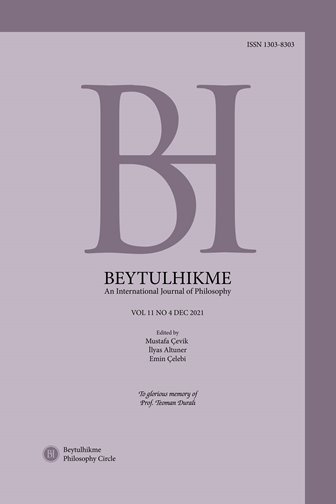Author :
Abstract
Bu çalışmada Aristoteles’in politik ekonomi anlayışı incelenmiştir. Politik ekonomi ile kast edilen modern dönemle birlikte ayrı disiplin haline gelen politika ve ahlak gibi alanların Aristoteles düşüncesinde iç içe geçen bütüncül bir yapı sergilemesidir. Aristoteles, insanın nihai ereği olan mutluluğa erişme noktasında ekonomik faaliyetlerin önemine dikkat çekmiş fakat bunun politika ve ahlak gibi disiplinlerle bağlantılı olarak ele alınması gerektiğini iddia etmiştir. Bu iddia temelinde çalışmanın odak noktası ticaret ve tarım gibi ekonomik faaliyetlere ilişkin Aristoteles’in açıklamalarını izah edip Politika ve Niakamakhos’a Etik eserlerinde bahsi geçen alanlardaki çelişkili gibi görünen ifadelerinin nasıl anlaşılması gerektiğidir. Çalışmada ayrıca Aristoteles’in özellikle ticarete ilişkin olumsuz yargılarının sebebinin bazılarının iddia ettiği gibi ideolojik bir önyargıdan değil felsefesinin bir gereği olduğu sonucuna varılmıştır. Çalışmanın nihai sonuçlarından biri de Aristotelesçi politik ekonomi görüşünün, modern kapitalist ekonominin noksanlarını eleştirebilmek için bir standart sunabileceğidir.
Keywords
Abstract
In this study, Aristotle’s notion of political economy was examined. What is meant by political economy is that the disciplines such as politics and morality, which have become separate disciplines from the modern period, exhibit a holistic structure that is intertwined in Aristotle's thought. Aristotle drew attention to the importance of economic activities in attaining happiness, which is the ultimate goal of human beings, but claimed that this should be considered in connection with disciplines such as politics and morality. Based on this claim, the focus of the study is to explain Aristotle's explanations regarding economic activities such as trade and agriculture, and how to understand his seemingly contradictory statements about the fields mentioned in Politics and Nicomachean Ethics. In particular, it will be tried to show that the reason for his negative judgments about trade is not an ideological bias, as some claim, but a necessity of his philosophy. The final claim of the study is that the Aristotelian view of political economy can provide a standard for criticizing the deficiencies of the modern capitalist economy.
Keywords
- Ağaoğulları, M. A. (2013). Kent Devletinden İmparatorluğa. Ankara : İmge Kitabevi Yayınları.
- Aristoteles. (2004). Retorik. (M. H. Doğan, Çev.) İstanbul: Yapı Kredi Yayınları.
- Aristoteles. (2012). Nikomakhos'a Etik. (S. Babür, Çev.) Ankara: BilgeSu.
- Aristoteles. (2012a). Politika. (M. Tunçay, Çev.) İstanbul: Remzi Kitabevi.
- Aristoteles. (2018). Politika. (Ö. Orhan, Çev.) İstanbul: Pinhan Yayıncılık.
- Crespo, R. F. (2010). Aristotle on The Economy. Philosophia, 39-68.
- Çoban, F. (2010). Emek'ten Eylem'e: Hannah Arendt. H. O. İnce içinde, Günümüzde Yeni Siyasal Yaklaşımlar (s. 92-137). Ankara: DoğuBatı.
- Finley, M. I. (1973). Ancient Economy. Los Angeles: University of California Press.
- Inamura, K. (2011). The Role Of Reciprocity In Aristotle's Theory Of Political Economy. History of Political Thought, 565-587.
- Kant, I. (1991). The Metaphysics of Morals. (M. Gregor, Çev.) New York: Cambridge University Press.
- Kapetanakis, P. (2018). Aristotle on Wealth-Acquisition: Ethical, Economic and Political Issues. The Edinburg University.
- Koumparoulis, D. N. (2011). Aristotle’s Economic Thought. Euro Economica, 161- 172.
- Leshem, D. (2016). What Did the Ancient Greeks Mean by "Oikonomia?". The Journal of Economic Perspectives, 225-238.
- Meikle, S. (1995). Aristotle's Economic Thought. Oxford: Clarendon Press.
- Mendus, S. (2017). Kant: "Dürüst Ama Dar Kafalı Bir Burjuva mı?". H. Çörekçioğlu içinde, Kant Felsefesinin Politik Evreni (s. 155-184). İstanbul: Ayrıntı Yayınları.
- Moseley, A. (2020). Siyaset Felsefesine Giriş. (B. Karakaş, Çev.) İstanbul: Metropolis Yayıncılık.
- Pack, S. J. (2010). Aristotele, Adam Smith and Karl Marx: On Some Fundamental Issues in 21st Century Political Economy. Cheltenham: Edward Elgar Publishing Limited.
- Platon. (2007). Yasalar. (C. Şentuna, & S. Babür, Çev.) İstanbul: Kabalcı Yayınevi.
- Pseudo-Aristoteles. (2016). Oikonomika. İstanbul: Kabalcı Yayıncılık.
- Ross, D. (2011). Aristoteles. (A. Arslan, Çev.) İstanbul: Kabalcı.
- Smith, A. (2006). Milletlerin Zenginliği. (H. Derin, Çev.) İstanbul: Türkiye İş Bankası Kültür Yayınları.
- Strauss, L. (1962). Aristotle's Politics. (J. Cropsey, Derleyici) Chicago.
- Swanson, J. A. (1994). The Economy: A Public Place for Private Activity. J. A. Swanson içinde, The Public and the Private in Aristotle's Political Philosophy (s. 6994). Ithaca, New York: Cornell University Press. Öz: Bu çalışmada Aristoteles’in politik ekonomi anlayışı incelenmiştir. Politik ekonomi ile kast edilen modern dönemle birlikte ayrı disiplin haline gelen politika ve ahlak gibi alanların Aristoteles düşüncesinde iç içe geçen bütüncül bir yapı sergilemesidir. Aristoteles, insanın nihai ereği olan mutluluğa erişme noktasında ekonomik faaliyetlerin önemine dikkat çekmiş fakat bunun politika ve ahlak gibi disiplinlerle bağlantılı olarak ele alınması gerektiğini iddia etmiştir. Bu iddia temelinde çalışmanın odak noktası ticaret ve tarım gibi ekonomik faaliyetlere ilişkin Aristoteles’in açıklamalarını izah edip Politika ve Niakamakhos’a Etik eserlerinde bahsi geçen alanlardaki çelişkili gibi görünen ifadelerinin nasıl anlaşılması gerektiğidir. Çalışmada ayrıca Aristoteles’in özellikle ticarete ilişkin olumsuz yargılarının sebebinin bazılarının iddia ettiği gibi ideolojik bir önyargıdan değil felsefesinin bir gereği olduğu sonucuna varılmıştır. Çalışmanın nihai sonuçlarından biri de Aristotelesçi politik ekonomi görüşünün, modern kapitalist ekonominin noksanlarını eleştirebilmek için bir standart sunabileceğidir. Anahtar Kelimeler: Politik ekonomi, tarım, ticaret, iyi yaşam, mutluluk.
